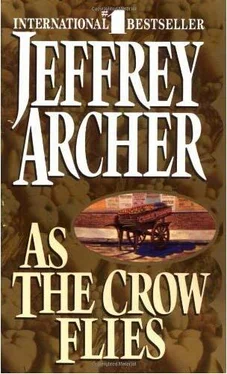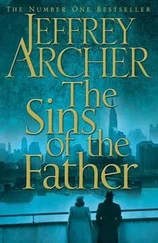"How much did you have to pay to get it back?"
"Fifty pounds."
"I told you not to offer him more than twenty pounds without consulting me."
"I know, but there was a West End dealer nosing around the shop at the time. I just couldn't risk it, could I?"
I didn't believe for one moment that it had cost Harris fifty pounds. However, I did accept that he realized how important the picture was to my future plans.
"Would you like me to hand the painting over to the police?" he asked. "I could then drop a hint that perhaps—"
"Certainly not," I said without hesitation. "The police are far too discreet in these matters. Besides, what I have in mind for Mr. Trumper will be a great deal more humiliating than a private interview in the privacy of Scotland Yard."
Mr. Harris leaned back in the old leather chair and began clicking the knuckles of his left hand.
"What else do you have to report?"
"Daniel Trumper has taken up his place at Trinity College. He's to be found on New Court, staircase B. Room 7."
"That was all in your last report."
Both of us stopped speaking while an elderly guest selected a magazine from a nearby table.
"Also, he's started seeing quite a lot of a girl called Marjorie Carpenter. She's a third-year mathematician from Girton College."
"Is that so? Well, if it begins to look at all serious let me know at once and you can start a file on her." I glanced around to be sure no one could overhear our conversation. The clicking began again and I looked back to find Harris staring fixedly at me.
"Is something worrying you?" I asked as I poured myself another cup of tea.
"Well, to be honest with you there is one thing, Mrs. Trentham. I feel the time might have come for me to ask for another small rise in my hourly rate. After all, I'm expected to keep so many secrets"—he hesitated for a moment—"secrets that might . . ."
"That might what?"
"Prove to be invaluable to other equally interested parties."
"Are you threatening me, Mr. Harris?"
"Certainly not, Mrs. Trentham, it's just that—"
"I'll say this once and once only, Mr. Harris. If you ever reveal to anyone anything that has passed between us it won't be an hourly rate that you'll be worrying about but the length of time you'll be spending in prison. Because I also have kept a file on you which I suspect some of your former colleagues might well be interested to learn about. Not least the pawning of a stolen picture and the disposal of an army greatcoat after a crime had been committed. Do I make myself clear?"
Harris didn't reply, just clicked his fingers back into place, one by one.
Some weeks after war was declared I learned that Daniel Trumper had avoided being called up. It transpired that he was now to be found serving behind a desk in Bletchley Park and was therefore unlikely to experience the wrath of the enemy unless a bomb were to land directly on top of him.
As it happened, the Germans did manage to drop a bomb, right in the middle of my flats, destroying them completely. My initial anger at this disaster evaporated when I saw the chaos it left behind in Chelsea Terrace. For several days I gained considerable satisfaction from just standing on the opposite side of the road admiring the Germans' handiwork.
A few weeks later it was the turn of the Musketeer and Trumper's greengrocer shop to feel the brunt of the Luftwaffe. The only perceptible outcome of this second bombing was that Charlie Trumper signed up for the Fusiliers the following week. However much I might have desired to see Daniel disposed of by a stray bullet, I still required Charlie Trumper to remain very much alive: it was a more public execution I had in mind for him.
It didn't require Harris to brief me on Charlie Trumper's new appointment at the Ministry of Food because it was fully reported in every national paper. However, I made no attempt to take advantage of his prolonged absence as I reasoned there could be little purpose in acquiring further property in the Terrace while war was still being waged, and in any case Harris' monthly reports revealed that Trumper's was steadily losing money.
Then, when I was least prepared for it, my father died of a heart attack. I immediately dropped everything and hurried off to Yorkshire in order to oversee the arrangements for the burial.
Two days later I led the mourners at the funeral, which was held in Wetherby parish church. As titular head of the family, I was placed on the left-hand end of the front pew with Gerald and Nigel on my right. The service was well attended by family, friends and business associates alike, including the solemn Mr. Baverstock, clutching onto his inevitable Gladstone bag that I noticed he never let out of his sight. Amy, who sat in the row directly behind me, became so distressed during the archdeacon's address that I don't believe she would have got through the rest of the day had I not been there to comfort her.
After the mourners had left I decided to stay on in Yorkshire for a few more days while Gerald and Nigel returned to London. Amy spent most of the time in her bedroom, which gave me the chance to look around the house and check if there was anything of real value that could be rescued before I returned to Ashurst. After all, the property would—once the will had been administered at worst—end up being divided between us.
I came across my mother's jewelry, which had obviously never been touched since her death, and the Stubbs that still hung in my father's study. I removed the jewelry from my father's bedroom, and as for the Stubbs, Amy agreed over a light supper in her room that for the time being I could hang the painting at Ashurst. The only other item left of any real value, I concluded, was my father's magnificent library. However, I already had long-term plans for the collection that did not involve the sale of a single book.
On the first of the month I traveled down to London to attend the offices of Baverstock, Dickens and Cobb to be informed officially of the contents of my father's will.
Mr. Baverstock seemed disappointed that Amy had felt unable to make the journey but accepted the fact that my sister had not yet recovered sufficiently from the shock of my father's death to contemplate such a trip. Several other relations, most of whom I saw only at christenings, weddings and funerals, sat around looking hopeful. I knew exactly what they could expect.
Mr. Baverstock took over an hour performing what seemed to me a simple enough responsibility, though to be fair he managed with some considerable dexterity not to reveal the name of Daniel Trumper when it came to explaining what would eventually happen to the estate. My mind began to wander as minor relations were informed of the thousand-pound windfalls they would inherit and was only brought sharply back to the droning voice of Mr. Baverstock when he uttered my own name.
"Mrs. Gerald Trentham and Miss Amy Hardcastle will both receive during their lifetimes in equal part any income derived from the Trust." The solicitor stopped to turn a page before placing the palms of his hands on the desk. "And finally, the house, the estate in Yorkshire and all its contents plus the sum of twenty thousand pounds," he continued, "I bequeath to my elder daughter, Miss Amy Hardcastle."
"Good morning, Mr. Sneddles."
The old bibliophile was so surprised the lady knew his name that for a moment he just stood and stared at her.
Eventually he shuffled across to greet the lady, giving her a low bow. She was, after all, the first customer he had seen for over a week—that is if he did not count Dr. Halcombe, the retired headmaster, who would happily browse around the shop for hours on end, but who had not actually purchased a book since 1937.
Читать дальше












